Cashew business and Future of South East Economy (4)
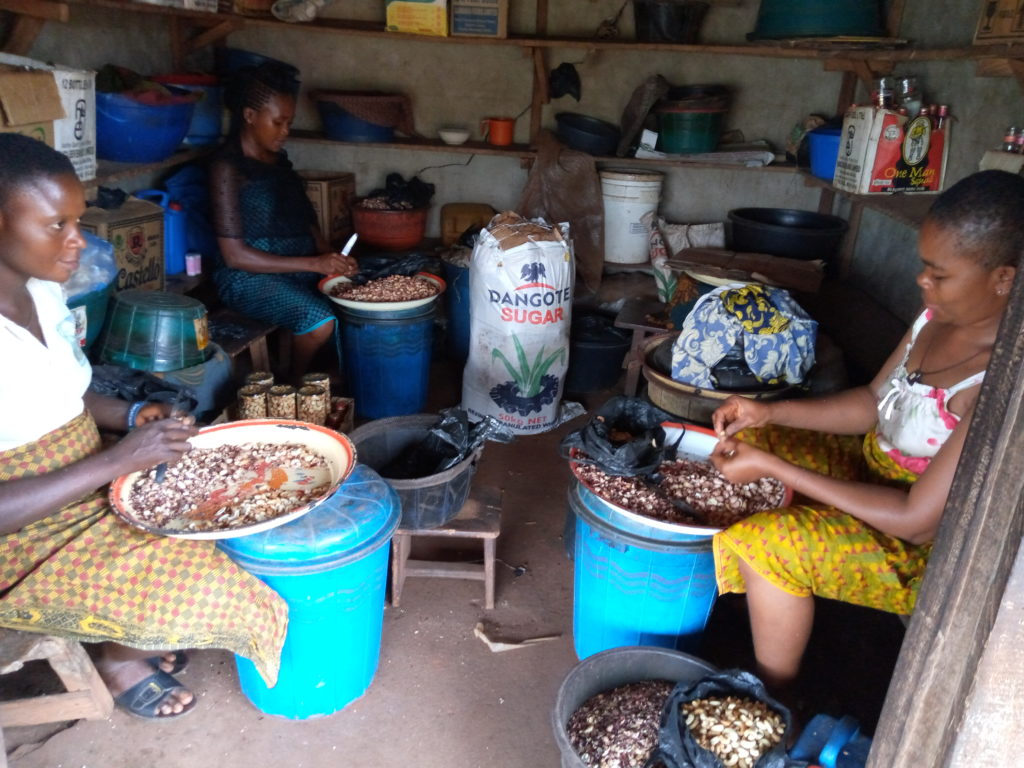
Local Cashew Processing
Cashew nuts paradox: SME’s disruption, revolution and future of South-East in the multi-Billion naira industry (4)
By Odogwu Emeka Odogwu
Ekegbo Achi Community without a bottle of cashew
I arrived the market by 10 am but unfortunately I did not see even a single cashew seller at the old Ekegbo market and the large ultra-modern new site of the Ekegbo market. Ekegbo old market is now a daily market, whereas the new market has thousands of make shift stalls thriving with an ultra-modern market under construction. I was anxious to know why. I spent an hour going round the market until I met palm kernel sellers who explained to me that cashew business is very early morning business. They said cashew sellers and buyers have finished their business before 8am as they resume as early as 5:30 am. And between 6:30 am and 7:30 am, everything must have been over. They showed me a bag of raw cashew nuts waiting for the buyer to complete evacuation.
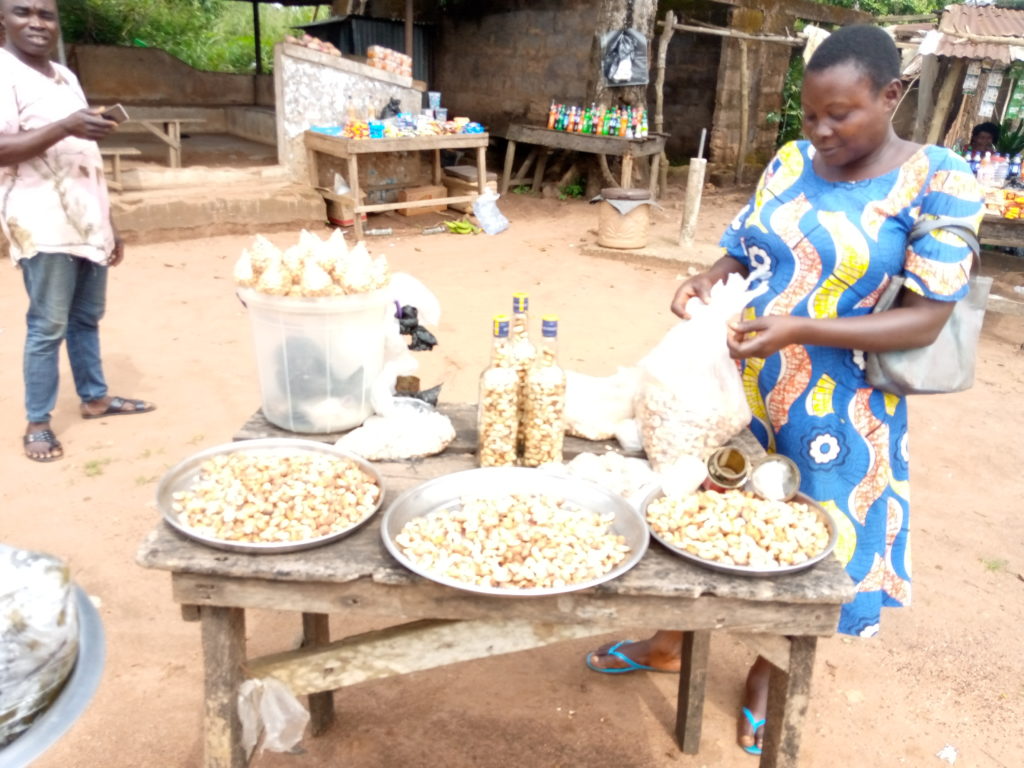
The market comes up every other four market days and it is acclaimed to be the home of cashew raw nuts and half done roasted cashew nuts waiting for final drying and packaging. Though dry ones are there too but they don’t dwell much on that.
According to Christian Iloh, Enugu Achi village, November isn’t cashew season but the community cashew farmers have enough cashew stored known as storage for sell hence cashew never out of season in Achi.
He confirmed everyone in the village pick the cashew during its season even as he said the traditional ruler of Achi community, Igwe Chima Achikwere can ask the government to intervene in bringing cashew processing machine to the community. He said he has no capacity to speak on that even when he knows that government lackadaisical attitude contributed to why cashew business has not picked at the highest level like cocoa and tobacco.
I was worried that a community known as cashew processing community has not even a bottle of cashew anywhere at sight. As I was meditating over this, I saw the traditional ruler of Inyi community, a neighbouring community to Achi but he turned down an interview request, despite explaining who I was and why my trip.
Nwakaego Nze, a raw cashew nut dealer noted that during February/March up till May that raw cashew becomes available everywhere in all varieties and the business thrives, but after its season then those who engage in storage continues to do business till the next season. She has only three painters in the house, lamenting that cashew business dropped this year. She wants government to fix prizes for cashew to avoid the low prizing by white men and their agents. She advocates for cashew processing factories to be established in Achi for processing of cashew fruit juice , cashew nuts and other snacks.
The Secretary, National Cashew Association of Nigeria , NCAN, Achi unit, Okey Enwelu said those who deal on cashew nuts, mostly deal on palm kernels but that the season is over until next year. He however confirmed the cashew business has ended for the day. It ends hours before that of palm kernel and other related businesses. He said cashew plantations are numerous in the community. He said if there is money in their hands, white men and their agents would be determining the prizes of cashew nuts arbitrarily. He appeals for a cashew processing plant in Achi.
Eze Ejike is the Financial Secretary, National Cashew Association of Nigeria, NCAN, Achi unit. He was point blank on his views that there is monopoly in the business. There is need to have marketers those who wish to sell theirs would supply to not only shrewd merchants who fix the prizes themselves and suffocate other players in the chain.
Cashew at last at Ekegbo Achi
I was going out of Achi at the junction I early passed heading to Ekegbo Achi old market and new market behold there were cashew nut sellers. I was surprised to see them. I stopped to find out why.
Chisom Okwu from Isiokwu Amankpunato Achi said she has been in the business for 10 years. She admitted that they deal on storage to ensure their business did not suffer. She sells N1,500 a bottle an claims in other places they sell more than N1,500. The Achi as a community needs a cashew processing plant and the local cashew women some grants to leverage on. She admitted that the cashew market is an early morning market. She said they all went there before coming out to sell at the junction. She claims people from Nsukka and other communities across Nigeria comes to buy from them.
Collaborating her claims was Edith Uwakwe from Aninri local government area who has been in the business for 7 years. She said white men made the business costly to be in as they have monopolized the market, determining the market prize for selling, buying and all that. She said when they a painter of raw cashew nuts N500, they buy N700 which is not supposed to be so. She confirmed the early morning cashew market. She said they buy from people who have cashew stored to continue to serve their customers always.
She informed that cashew business ends by 7am unless those who were late may drag it to 8am. She wants government intervention to save them from shylock merchants. She informed cashew was still available because white men did not come this year as usual. She said last year they bought one raw cashew painter for N700 but this year N300. She confirmed the need for a cashew processing plant in Achi.
For Ogugua Ann who has been in the business for 10 years, she said Ekegbo Achi cashew sellers fry and sell a painter of cashew to them and others from other places at N7000 and N8,000 previous year but this year and on that market day, they bought N6,500 and N6,000 early in the morning . I bought a bottle N1400 there.
Cashew plantations and business in Nsukka community
I left Awka on November 21st heading to Opi Nsukka to know the source of cashew they sell but discovered Nsukka is the home of cashew business in Nigeria. At Amaeze Idi Opi Uno Nsukka there is large cashew plantation. I was told cashew plantation is everywhere in Nsukka and environs like Opi Uno , Obollo Afor , Orba, Eha Alumuno among others and the plantations are individually owned.
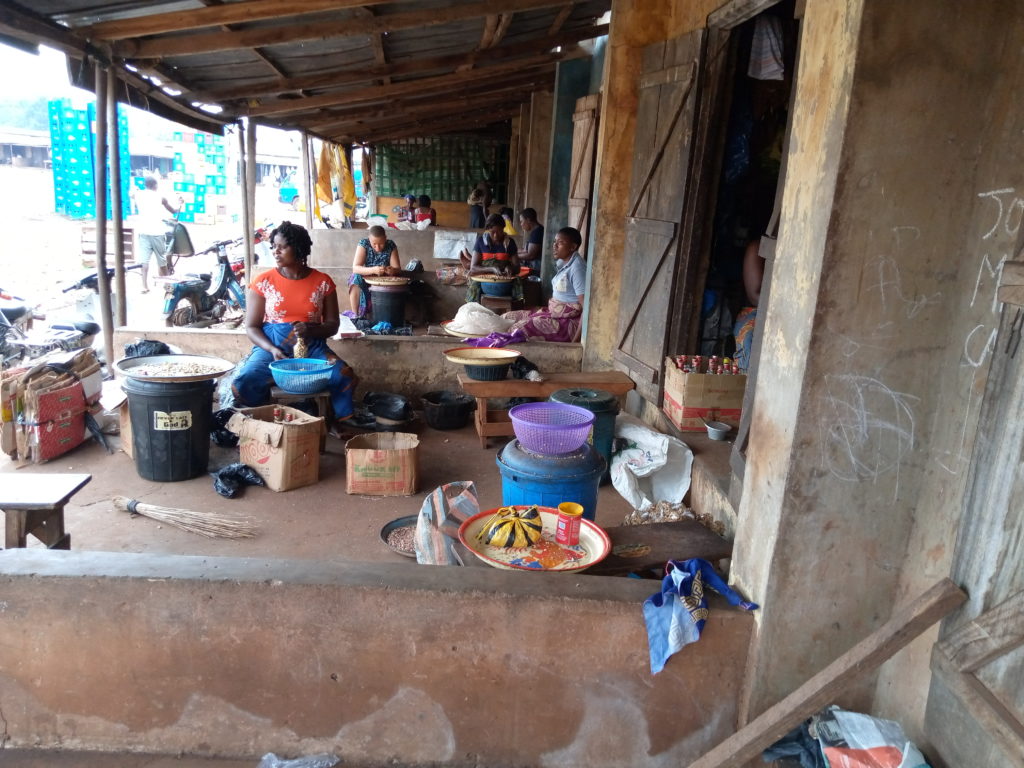
Ugwu Nnenna who has been in the business for 3 years after leaving school said they don’t trouble themselves in Opi looking for raw cashew nuts to fry but they already prepared nuts by the cashew farmers which they call half done. These half done is what they now take to Obollo Afor and bake to their desire before bottling or putting in nylon bags for different prizes.
When they had no strength for the processes, thy just go to Obollo Afor and buy already prepared ones which she said they buy for N1,200 and sell anything from N1300 to N1500. There are two colours they bake the nuts-brown and white. She said white men buys from them at Opi or Obollo fried nuts. She informed me that if one goes to someone plantation, the person can eat as many cashew fruits as possible but should not go with the nuts. She informed people from other parts of the country buy from them at N1300 and resell for between N1500 and N2000.
She couldn’t tell me how much gain she makes in a day but she said the entire family depended much on the gains and she solves her problem from that.
For Miracle Ezenma who has been in the business for 2 years after leaving SSSCE, she buys from Obollo Afor at N1, 000, N1, 050 and N1100 and sells anything from N1,300 to N1,500 depending on the market. She directed me to Afor Opi for the raw cashew nuts as it is seen in large quantities there but that day wasn’t the Afor market. They sell in trays and nylon bags half done at Afor Opi for them to further the processing. Reserved cashew which they call storage is on sales now.
On her own, Mmesoma Agbo has been in the business for three years since she left secondary school. She referred me to Obollo Afor cashew bakery to see things for myself. She said only fresh dry nuts could be sold in Obollo Afor because they have an association guiding them. But she educated me a little on how they hustle for the cashew nuts. She said fresh raw cashew nuts is sold at N300 a painter whereas a bigger special painter for dry fresh nuts is N12, 000.
She wants the state and federal government to champion installation of modern equipment for all the stages of cashew processing. She said there are few ovens for baking the cashew, but the community needs cashew nut extracting machines and frying ovens to lessen the burden of local processing for half done before taking to the bakery.
Nsukka cashew, here I come
I was directed to a large ultra-modern park at Obollo Afor where I was shocked to see thousands of women busy bottling, picking cashew nuts. Others were packing it into small nylon bags for N500 and N200, while the broken ones are packaged in small prizes. I didn’t ask them how much they sell it to wholesalers but I am sure cheaper than market prizes since they sell the bottles N1200. That was their latest decision at a meeting held shortly before I came I was told by Mrs Ann Simeon who has been in the business for 6 years.

Mrs Simeon said they buy from people who process it half way and sell to them to complete the processes. She said they buy painters for N10, 500. She disclosed that a good painter can get 9 bottles and they can pick a complete painter in a day. A painter could be said to be a full bag of black and yellow polythene. She said government bringing in processing machine would enhance their businesses not only in Nsukka and South East but in Nigeria. They use the cashew nuts chaff for as dust for cooking too. There is a caveat. The cashew because it has no preservatives and natural lasts in good form for three months and it starts to change taste.
Collaborating her views were Mrs Odoh Helen and Emeka Agatha informed that the business is what they depended for their own cars and modern houses , naming some people who have been in the business in the last 20 years and have acquired their own houses and cars. The women claimed their members were over 5,000 specializing in cashew business.
They said that government should own cashew plantations and encourage cashew farmers with high agriculture yielding cashew nuts for massive production of raw cashew for enhanced processing and reduced cost. She said it is hectic processing the cashew to its best international standards. She said they have oven at Edmark plaza and about 6 others for drying up the cashew for better taste and lasting impression. The bakeries for baking the cashew nuts are personal businesses. They confirmed that all the baked cashew businesses across Nigeria is done in Nsukka an nowhere else. They said in Nsukka, people own plantations. There challenge included white men who load trucks of raw cashew nuts outside Nigeria.
Ojobor Juliet admitted that the equipment brought to that center if installed will change the business of cashew in Obollo Afor but they are waiting for the installation. There were heaps of cashew nuts in bottles and nylon bags. I was even late as their customers have moved with loads of cashew to all parts of the country before my arrival.
Government cashew processing plant in Nsukka
The women said there was nothing like that but a scam. They are not aware of any Federal government plant but recalled that there is one big ‘scam’ they were invited to witness four years ago yet as they spoke to me nothing has happened. They informed that the only government project on cashew they know about in Nsukka isn’t working. They even advocated that the money wasted there so far would have been shared to them to boost their business. They accused those who invited them there scammed them as they were promised that they would be shared money as soft loans to boost their business, only for them to waste their time and business hours for nothing. They said there was a gigantic open warehouse with yet to be unveiled equipment for cashew processing but yet to be fixed.
The thousands of women were busy picking their heaps of cashew that they had no time for speaking to the media.
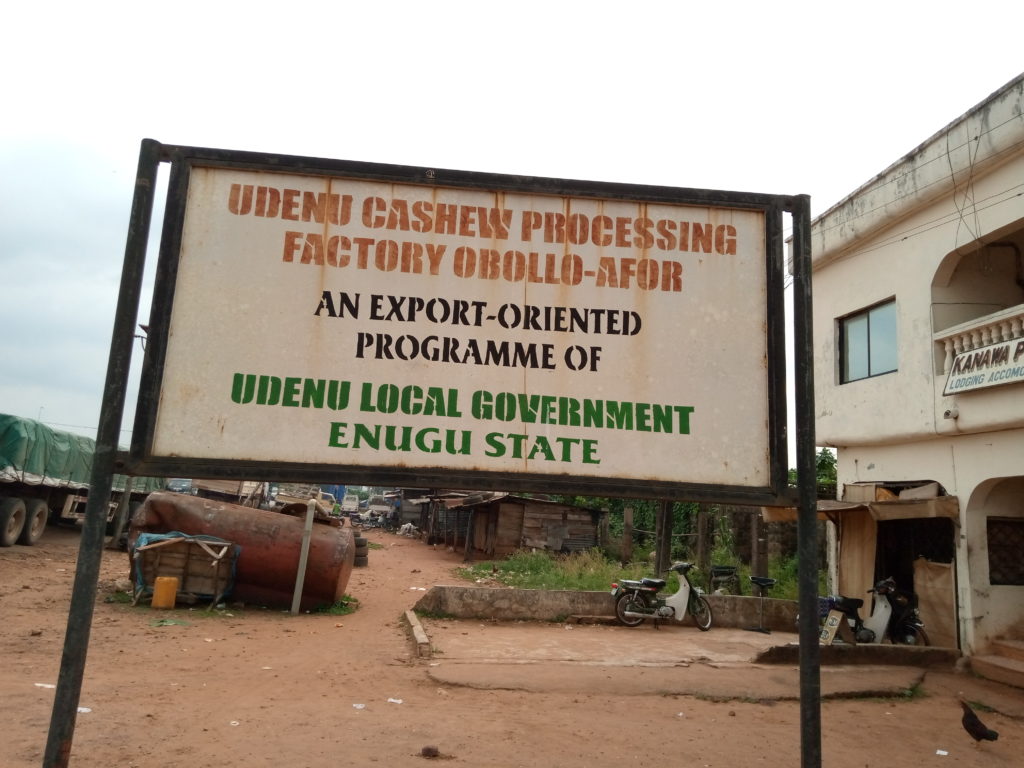
At the government cashew nut processing site
I met a mason man who identified himself as Kazeem with six other labourers working at the site. Kazeem said they would be done with the plastering of the house and fixing the windows in a week. The building is large like about one football pitch and inner room and ancillary rooms. I didn’t ask the labourers because the contractor isn’t at site and there is no contact lines made available to me.
Cashew mill
Hyacinth Azubuike a cashew nut baker said the machine could be used for baking groundnut and cashew as well as other things like meat and even bread. He was originally a bread baker. He said the minutes the cashew stays in the oven depends on the quality of fire in the oven. He has been in the business for 2 years. He said four trays of cashew nut is fried with N50.00. The oven has four chambers. He informed that there are about 8 bakeries in Nsukka. And machine costs between N750,000 to N2Million depending on the type. He has a miner’s touch on his head to determine whether the cashew is done or not. He uses long lifter to pick the cashew from the oven.
For Benjamin Odika from Imo state confirmed that his state Imo does not know the value of cashew outside personal harvest and eating the fresh cashew nuts hence he was in Nsukka baking cashew and his machine type according to him is N2 Million. And each apartment of the four apartment contains 18 pans or more depending on type of pan. He said cashew came into Nsukka from other parts of South East and North Central like Kogi state and Benue to Obollo Afor Nsukka park for processing. He has been one year in the business. He does not know any government processing factory in the community. He was a master baker before now.
Cashew nut in Obollo-Afor in focus
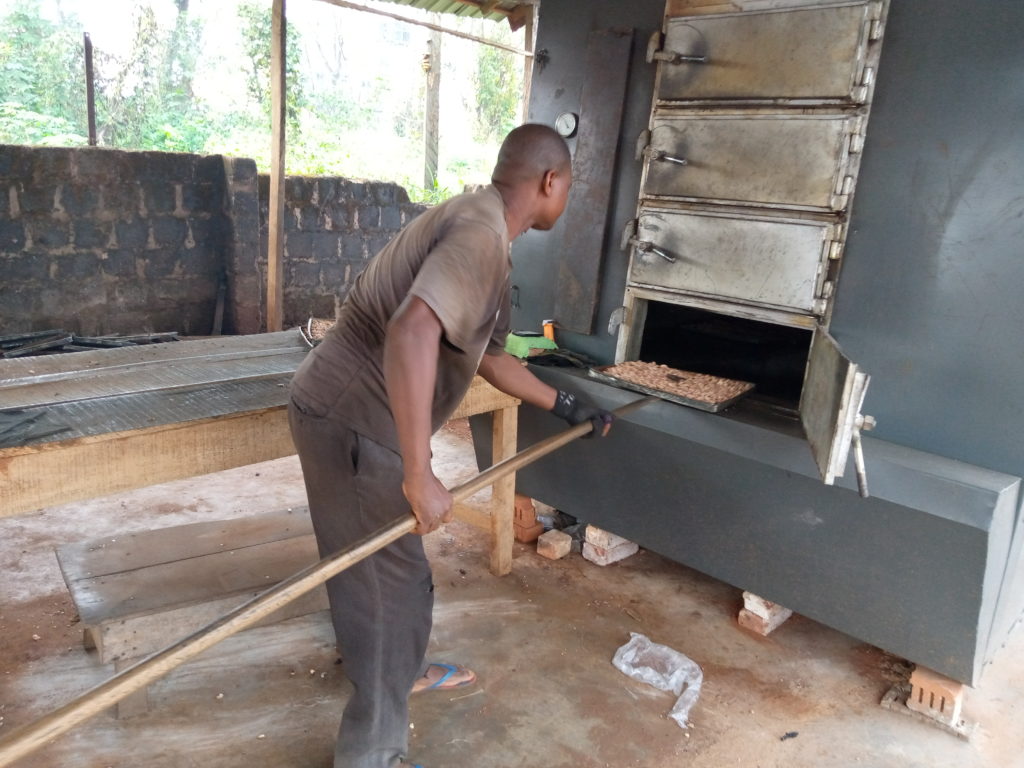
Cashew nut is a raw material. This raw material could be turned into millions of naira, if not dollars. Where are the SME’s driving businesses in the cashew industry? Is there this financial reward in cashew nuts?
Not at all as the President of one of the biggest cashew nut markets in South East at Obollo-Afor, Mrs Oluchi Onah said. Onah is known as the President, Cashew Nuts Processors Association, Obollo-Afor. She has over 2,000 members trading cashew, mostly women. The group has capacity of processing and packaging 5,000 bags a day. They process and package cashew for sustenance of their families. She has been in the business for about 15 years but according to her it is a tedious job, ‘ without corresponding financial reward’’.
She had said an earlier interview with newsmen: ‘’we usually make about N500 per bag and the highest one can process in a day is two to three bags. The process is manual and tedious, that is our major challenge here. We have over 1000 members under our association but some other persons are on their own’’.
Why the drudgery you may ask? Why has state governments in South East not intervened on this line of business? The federal government did half way and abandoned the initiative. The Export Promotion Council provided a cashew nuts processing machine to reduce the stress by the processors, boost daily production but the machine has not been put to use. It was blamed on the local government not completing the structure where the machine would be installed before taking off.
According to Mrs Onah: ‘’The Export promotion Council has provided a machine for processing of the product but it is not in use yet, because the local government is still putting the structure in place. When it is done, we can now process with the machine, then we can make a larger quantity;
Again, the cashew nut farmers are not accessing loans even soft loans to enhance their trade. Onah said they needed soft loans to assist them buy more products for processing to boast their income.
Has the business lost steam? Yes! This was like a chorus by the women as they agreed that before 2017 it was a real business sustaining them in tackling whatever problems that crop up, be it school fees, burial even buying property. But since three years now, they suffer for the wholesalers. Some women have abandoned the business because of dwindling fortunes.
According to Mrs Jacinta Ugwu , Mrs Gloria Ugwuagu, and Mrs Evelyn Onah, the business presumed a gift from God for the poor rural women have been taken over by money bags who are now wholesalers, selling to distributors or companies in larger quantity after buying from us. They believed they are suffering for others but thanked God for the much blessings still left for them to actualize with the cashew nut business.
Mrs Ugwu believed that if government provides enabling environment for companies to build a biscuit making plant, cashew nut processing plants and cashew juice to mention but a few, their fortunes will change for the better.
Manager of the cashew nuts company, Mr Silas Andrew confirmed Obollo-Afor as the center of cashew trade within South East and Middle Belt region, noting that ‘’ Obollo-Afor is a centre of cashew nuts from Benue, and Kogi. We also have cashew nuts in large commercial quantities here in Ezimo, Umuitodo and other communities within Obollo.
‘’Although, the processing is hard, he claims, ‘ one can still make profit. We buy the raw nuts, process the whole thing before we now send them to other parts of the country and even beyond’, he concluded.
At a time, a bag of unprocessed cashew nuts was sold for N800 and later N1, 300 and the women made upto N300 in gain. White men came into the business in Obollo-Afor three years ago and started buying up raw cashew nuts at high prize that the prize for a bag went up to N1, 800. The women could not make any profit, some abandoned the business.
Udenu Local government area Boss reaction
Chairman of Udenu local government area, Enugu state where the Cashew processing plant is located, Hon Frank Ugwu did not want to speak on the delay on the project. All the texts and WhatsApp I sent to him and calls were earlier ignored even when he read them, but he later replied without delving into the issues I asked him.
I had wanted to know what delayed the construction of the Cashew processing plant for export and who was responsible for its construction, the equipment and how much that was involved. He was not forthcoming on that, though he apologized that I came without him seeing me. I pleaded further for information on the project but he recoiled.
Enugu 30,000 cashew seedlings to farmers
However, two years after the $7 billion worth of cashew nuts supply request from Walmart Super Market chain in the United States of America, the Enugu State Government started the distribution of 30,000 cashew seedlings to farmers so as to enhance cashew production in the state and boost its internally generated revenue.
The Director of Animal Production, Enugu State Ministry of Agriculture, Dr Nelson Onugwu, informed that the seedlings being distributed were special improved species of cashew which would take fewer years to mature.
Onugwu said: “We are encouraging people to come for the seedlings and go into cashew farming to enable the state to produce enough cashew for local uses and export the crop to countries that are in need of it’’.
Enugu state government subsidised the price of the cashew seedlings and sells N50 to farmers instead of its normal price of N200, even with a request for local government chairmen to procure the cashew seedlings and distribute to farmers in their council. The state government also established cashew aggregation and processing centres across the state to facilitate cashew processing and packaging
Workshops were organized by government and private organizations for civil servants and businessmen to join the multi-million raw cashew nuts wealth creation trade to make extra income while keeping their full time work or business.
They can learn about raw cashew nuts business ; cashew sourcing, pricing, quality and export standard; cashew Export opportunities; Local Trading opportunities; post-harvest practises; storage; funds, loans and financing.
New awareness begins from NGO
The New Enugu Project (TNEP), a Non-Governmental Organisation is calling on youths to return and maximise benefits of modern agriculture to empower themselves and create employment.
The Convener of TNEP, Mr Ekene Uzodinma, made the call during the weekend in Nsude community near Enugu while delivering a lecture on the theme: “Youths, Self-Sustainable and Empowerment through Agriculture’’. The lecture was delivered at Udi Youths Security Summit organised by Udi Sons and Daughters Forum.
Uzodinma at the summit established a link between insecurity, unemployment, and poverty, even as he reminded that the generation of the founding fathers of the country used agriculture to build and grow the country to the envy of western nations.
Most of the popular farm plantations and exploit in agriculture was done by them but today rather to build on what is existing most youths are busy cutting down economic trees and other historical monumental trees around.
“We should not lose focus that our fore-fathers made fame and wealth through agriculture and selling valuable cash crops to the Europeans. The same land is here lying fallow before us and climatic condition remained same,’’ he said.
The TNEP boss urged youths in Enugu State to take advantage of an ongoing agriculture/farming empowerment programme tagged: “One Youth, One Hectare’’ project, meant to empower and support would-be youth rice farmers, cashew farmers etc.
“The project is free-of-charge for interested youths, as the land will be prepared ahead, initial training given, extension service and consultancy advice service provided free-of-charge to check any challenge.
“And there is already off-taker that will buy the produce especially rice and other high yield crops according to soil peculiarities from them; thus, assuring a return on investment for the youths that participate in the project,’’ he noted.
But hitting the nail on the head at same security summit was Prof. Anslem Onyimoni, Professor of Animal Science in University of Nigeria, Nsukka (UNN), who urged youths to invest in cash-crop plantations such as cashew nut and palm oil since they have ever-growing local and international market.
Onyimoni, who spoke on “Youths and Security in Udi land’’, urged youths to ensure that they are not idle since idleness breeds lack and poverty, which lead many into crime and criminality.
“You can take advantage of skill acquisition programmes by the Federal and state government agencies as well as foreign donors to empower yourself and stopping demanding money from your aged parents,’’ he advised.
Igwe Paul Ogbodo, Chairman of Udi Local Government Area Traditional Rulers’ Council, noted that the traditional rulers would meet on the need to provide farmlands to support the agricultural initiatives discussed as a way to check unemployment and insecurity.
“The discussion will not end here; traditional rulers will meet and provide hectares of farmland to support organizations that want to assist youths especially in planting Bambara nut (Okpa nut), that grow well in this area’’.
Cashew nuts processing machines
There are different types of cashew processing machines ranging from single to double lines processing to complex production process. There are shelling and roasting among others. The cost ranges from as low as $4500 Dollars (N1, 450,000) to over $ 1 Million US Dollars (N362,500,000) depending on the function. There are even cheaper manual machines too in the market. A lot of options are available across the globe mostly in Asia including like China, Vietnam, and India. These should be made available to Nigerians particularly South-East cashew farmers.
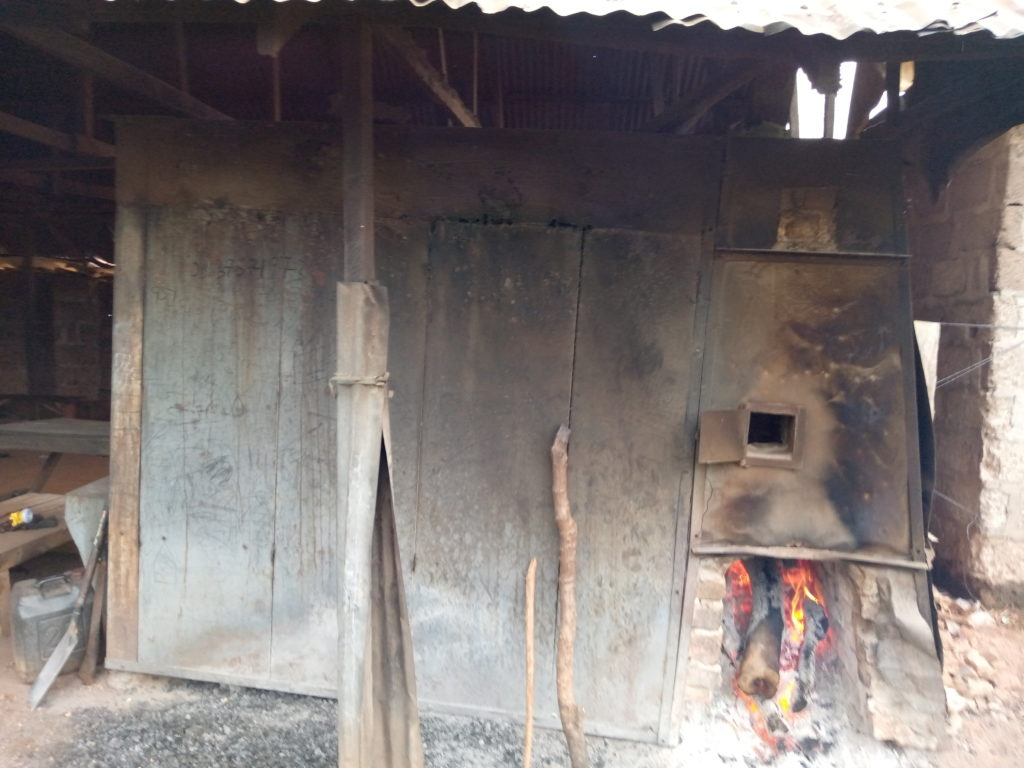
Conclusion
Over fifty years we have engaged in extensive cultivation and harvesting of cashew apples and nuts in South-East and other ancillary businesses, yet industrial revolution was limited to ovens for baking and roasting only in Nsukka zone. It is unheard of and that showed a sign of not being serious by our political leaders since the return of democratic rule in Nigeria. I conclude that it was all noise and no vibes by our leaders who now have better opportunity to rewrite the history by attracting genuine investors in that cashew nuts value chain.
The five Governors of the South East zone particularly Governor Ifeanyi Ugwuanyi of Enugu state and Governor Onyechi Ikpeazu of Abia state with the highest concentration of cashew ovens, retailers chain and plantations among others should ensure that SME’s relating to cashew spring up in Enugu and Abia state within the next couple of months for the states to have comparative advantage on the businesses. For Anambra Governor, Chief Willie Obiano and his Imo state counterpart, Right Hon Emeka Ihedioha with little cashew plantations should equally key in on that by attracting a few SME’s in that regards and collaborate with Enugu and Abia in fashioning a way out of the wastages in South East multi Billion cashew industry now determined by outsiders. Ebonyi Governor, Engr Dave Umahi whose state is said to have little or no cashew plantations aside the little for home consumption can give leadership as the Chairman of South East Governor’s forum.
Umahi of Ebonyi state should equally rally round the south east governors to get involved in the Cashew processing center championed for Obollo Afor and negotiate with the Federal Government on the actualization of that project for its purpose and not as one of its white elephant projects, never to be completed year in, year out, but the center at Nsukka should be a gateway for exportation of cashew nuts processed in South East to the rest of the world.
Cashew nut SME’s for South-East have had its disruption for years but the time for its revolution for a better future for the South East in the multi-Billion naira industry with SME’s springing up daily in that regards is now. The time to act for the interest of cashew nuts farmers and traders in the zone is now before the next cashew season. The paradox of cultivating, harvesting and processing cashew nuts for the entire Nigeria and beyond in the South-East, yet, no SME’s in that chain to show for it is a jinx yet to be broken.
Cashew is the new oil industry for South Easterners and all hands must be in the deck to turn it around into the multi-billion dollar business it is. This is because with collective efforts from stakeholders in the zone, the end is at sight of the neglect for the cashew industry.









